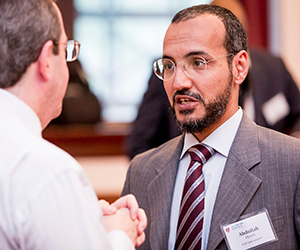
The first time Dr. Abdullah Aljoudi encountered an ethics case he was unsure how to manage, he was an intern just beginning his medical career at King Fahad Hospital in Saudi Arabia.
"I was rotating in the Department of Neural Surgery when my resident asked me to examine a patient in the ICU. The patient was brain dead,” said Aljoudi. He remembers standing at the foot of the patient’s bed while considering what to do next.
“Eventually, the head nurse shouted at me, 'Are you going to examine the patient or just call your senior?'” said Aljoudi. He chose to consult with his attending and they discussed the ethics of the case. “We talked about what brain death means, the criteria used to determine it, if we can be sure or not about death, and the role of a Muslim scholar in deciding the criteria,” said Aljoudi.
Committing to Study
Years later, Aljoudi traveled to Zurich, Switzerland, to attend the Zurich Intensive Bioethics Course, where he met Christine Mitchell, executive director of the Harvard Medical School Center for Bioethics. She encouraged him to apply for the bioethics fellowship.
"I wanted to add structure to my approach to decision making in medicine. I'd been interested in bioethics my entire medical career." Aljoudi joined to the program and in 2016 he boarded a plane from Saudi Arabia to Boston to begin his fellowship.
Although he couldn’t practice medicine in the U.S., Aljoudi made the most of his time by attending ethics committee meetings at four of the Harvard Medical School teaching hospitals in Boston: Massachusetts General Hospital, Boston Children's Hospital (BCH), Beth Israel Deaconess Medical Center (BIDMC), and Dana-Farber Cancer Center. At MGH and BCH, Aljoudi rounded in different units with physicians and ethics committee members. He also attended institutional review board meetings at Brigham and Women's Hospital.
Islamic Bioethics
Throughout his fellowship year, Aljoudi also lectured across the U.S. on Islamic bioethics, helping others to better understand the similarities and differences between Islamic and secular bioethics.
"In Islamic bioethics there is always a divine reference to God, while in secular bioethics there is no formal recognition of God in decision making."
Aljoudi says that Islamic and secular bioethics differ in their consideration of autonomy, reproductive ethics, and some patient interactions. "Western physicians are still learning about the importance placed on protecting the privacy of female Muslim patients,” said Aljoudi. "I was not surprised to learn that many nurses are the chairs of ethics committees in the U.S.," he said, noting that the nurses he observed were incredibly sensitive to privacy issues, and were particularly aware of the concerns of female Muslim patients.
In addition, Aljoudi attended monthly clinical ethics consortia hosted by the Center for Bioethics. Because Aljoudi lived full-time in Boston during his fellowship year, he was able to take advantage of many of the opportunities at Harvard Medical School throughout the week — many fellows are mid-career professionals who continue to work and attend formal coursework only on Fridays.
Theory Into Practice
Aljoudi applied to the fellowship program with the goal of returning to King Fahad Hospital, where he is currently a physician and assistant director for academic affairs, the head of Research Support Unit, and where he planned to establish a clinical ethics consultation service or a clinical ethics committee.
So far, Aljoudi says his bioethics work is going well. The ethics committee recently launched a consultation service to support physicians with ethical decision making in hospital settings.
Aljoudi said that learning first-hand at Harvard-affiliated hospitals, some of the world’s best, helped him set up the ethics committee at King Fahad Hospital. In particular, he noted that the strategic makeup of an ethics committee is a big part of its success.
“At MGH, BIDMC and BCH, the ethics groups consisted of more than just physicians; nurses, social workers, pharmacists, and other allied professionals also contributed to the group,” said Aljoudi. Secondly, Aljoudi says he observed how ethics consultation differs between hospitals, each with its own unique culture and approach to problem solving. Lastly, he says learning to incorporate rounds into the daily clinical practice of bioethicists in hospitals is something that he thinks made patients feel safer and more comfortable.
But of all that he learned, Aljoudi says the professional expertise and skills were not the most important.
Bioethics Immersion
“The fellowship was a terrific opportunity to network with other professionals in bioethics," said Aljoudi. "We call our fellowship class 'the critical friends' because we are so important to each other in helping to learn, challenge assumptions, and discuss ethics. Although different ideas are expressed in debates and discussions, we all respect each other's opinions.”
Since completing the program, Aljoudi and members of his fellowship class remain in contact via email and met for lunch during the 2018 Harvard Annual Bioethics Conference in April.
Aljoudi credits the multitude of opportunities and close network at Harvard with his success back in Saudi Arabia. He also recommends that anyone with a passion for delving deeper into bioethics should apply to a formal bioethics education program.
“I am passionate about bioethics. If we were assigned to read one or two chapters from a book, I would read the whole thing. The great part about being at Harvard is that there is always someone who wants to talk ethics, whether they are fellows, faculty, or master's students," Aljoudi said.
"My advice to others interested in bioethics is to find a program in which to immerse yourself. In the world of bioethics, Harvard is that place."